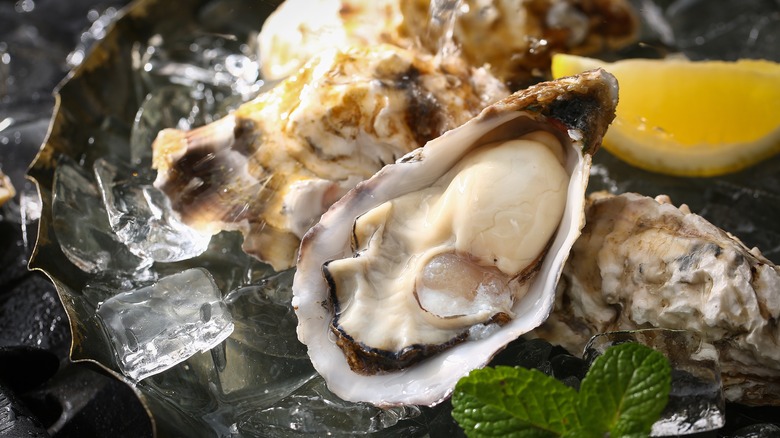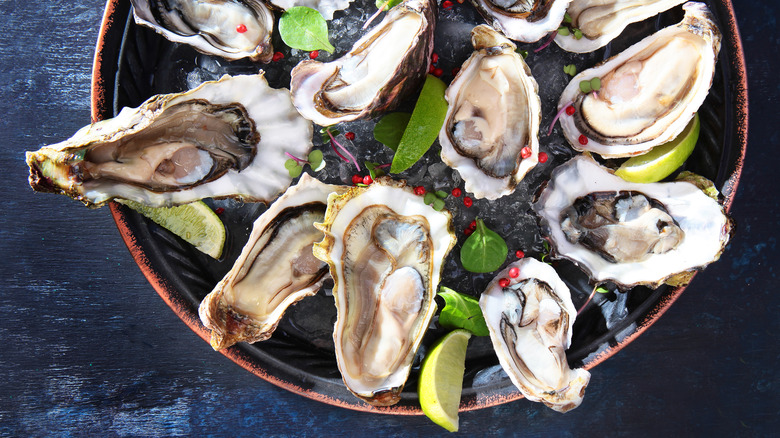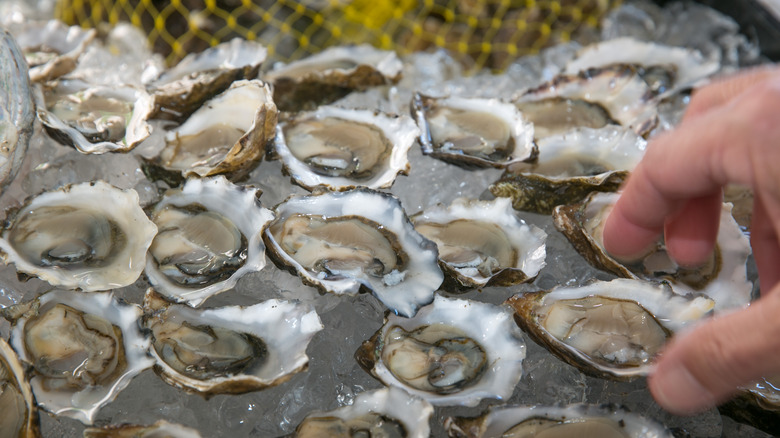The Chef-Approved Reason You Should Never Buy Frozen Oysters
From raw on the half shell with cranberry mignonette to grilled with butter and herbs, oysters are a delicacy many people love. Indeed, these mollusks have become quite a sought-after delicacy, whether enjoyed for their briny flavor or slurped for their aphrodisiac potential. While the food is often consumed shortly after harvest, frozen oysters are also a part of today's food-conversation.
However, one notable chef believes oysters are a food that should stay out of cold storage. As Erik Niel, owner of Easy Bistro & Bar and Main Street Meats, told Food & Wine, "Their water content is so high that, when they freeze, the water inside them inevitably bursts the cellular structure. This causes huge texture and flavor differences in the frozen versus fresh product." Niel's Easy Bistro & Bar has a robust raw bar menu, featuring a variety of oysters; based on the daily nature of this menu plus the chef's stance on frozen oysters, it can be assumed its oysters are ones that have only recently been harvested.
It appears oyster-lovers might have a new rule. While some go by the tradition of only eating oysters in months containing the letter "r," avoiding frozen oysters might be just as important. For that ultimate briny bite, it could be best to enjoy an oyster shortly after it is plucked from its bed.
Simple rules to remember when enjoying oysters
Shucking an oyster requires attention to detail, and avoiding frozen oysters isn't the only tip worth knowing. Some people might rely on advice from their local fishmonger, but ultimately, there's one cardinal rule: Proper handling is imperative. How can you tell if an oyster has been mishandled?
According to Foods, cooks should carefully examine fresh oysters for any apparent flaws. Signs like a closed shell, mild odor, clear or slightly opaque liquor, and being free of grit are all important markers of a viable oyster. In addition, if the shell is slightly open, it should snap closed once tapped; this reaction denotes that the oyster is still alive. It's also important to keep in mind that oysters in the shell have up to 10 days of viability, and shucked oysters have a five- to seven-day shelf-life.
That guidance is helpful, but there are also some myths and facts about eating oysters that the Food and Drug Administration wants you to keep in mind. Neither alcohol (like in an oyster shooter) nor hot sauce will destroy harmful bacteria within an oyster. Additionally, even though cooks should examine the shells and meat for flaws, bacterial contamination cannot be seen with the naked eye nor can aroma and taste denote its presence.
But, with due diligence and proper handling, oysters can still be delicious. Whether or not they will cause a libido-spike is debatable, but it can be fun to slurp down that succulent mollusk, regardless.
Simple ways to enjoy oysters
Oysters can be served in a multitude of ways. Whether shucked straight from the water source or cooked with care, the preparations can influence both the taste and texture of this delicacy.
Raw oysters is a common presentation. Served on the half shell, the mollusk can be served with something as complex as sriracha mignonette or as simple as a squeeze of lemon. For a unique taste, consider adding a little sake to bring out the subtle sweetness in the shellfish.
Another frequent application is Oysters Rockefeller. Credited to New Orleans' oldest foodservice establishment, Antoine's Restaurant, the baked oyster dish is considered quite rich. The combination of butter, spinach, and crackers feels luxurious. For diners who prefer a cooked option, this dish is often a favorite choice.
Other options include fried oysters, grilled oysters, and even using the ingredient in soup, like an oyster chowder. Each use showcases the ingredient by playing off of its flavor notes. From highlighting the briny qualities with the smokiness of a grill to contrasting its sweetness with a pungent hot sauce, cooks should experiment with all recipe options — as long as the oysters are fresh and never frozen.


